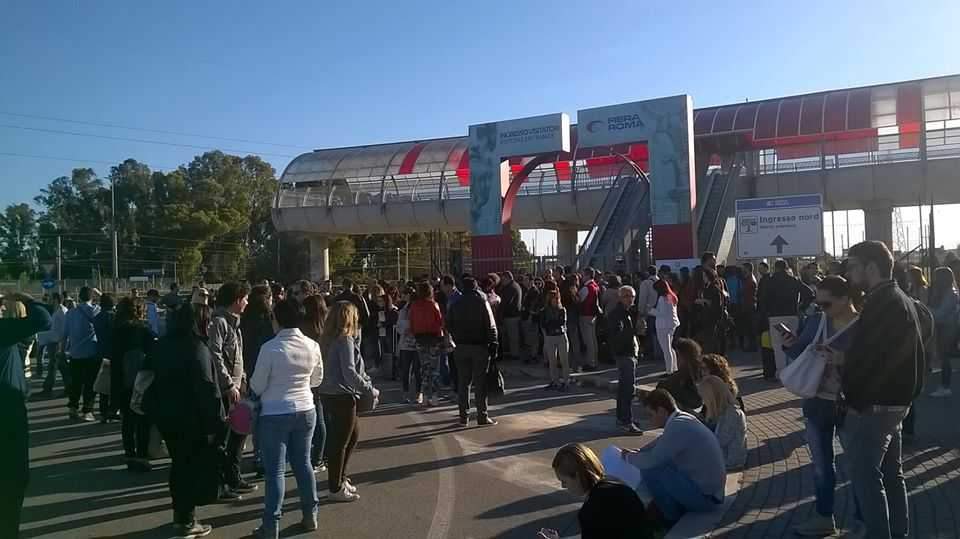MiBACT assistant competition, challenge: "Inadequate selection criteria, risks exclusion of the best-prepared"
We are publishing and receiving an open letter written by a candidate in the competition for 1,052 fruition, reception and supervision assistants announced by the Ministry of Culture and Tourism, whose pre-selection tests are being held at the Rome Fairgrounds from January 8 to 20, 2020. At the express request of the author, the letter is published anonymously.
I am 35 years old, I have a degree in art history and, like many other humanities graduates, I participated in the pre-selection of the competition announced by the Mibact for 1052 fruition, reception and supervision assistants. For the sake of brevity, I will not go into the fact that people with a degree and specialization in cultural heritage are forced, by the conditions given in Italy, to aspire to unqualified work as an almost exclusive professional outlet. This issue, by the way, you have already addressed in several articles, including the 10/01 article by Federico Giannini, for which I thank you. I will limit myself to considerations concerning the selection criteria, which I consider to be totally inadequate.
As is well known, the tests, which are still in progress, are being held over several days from 08/01 until 20/01, in two daily sessions. The test questionnaires, therefore, are different from one session to another (a fact that in itself lends itself to inequities) but this condition is aggravated by the fact that the tests do not have an equal distribution of the types of questions. I refer, by way of illustration, to two questionnaires of which I have knowledge, the first as it was carried out by me, the second by friendly participants: the afternoon questionnaire of 9/01 presented a majority of calculus questions (number series, combinatorial calculus, direct and inverse proportionality, etc.) while, the morning questionnaire of 10/01, a majority of syllogisms, i.e., logical-verbal reasoning questions.
Leaving aside for a moment, the appropriateness of evaluating candidates for a culture profession on this kind of quiz, it is evident that to ensure an equal difficulty of the tests, each should present the same number of questions per type (e.g., 5 of logical-mathematical reasoning; 5 of verbal-critical character and so on for each test session). Otherwise, ignoring this criterion, it will be luck not preparation that will decide who comes out favored.
Moreover, the texts on which to prepare and the simulation software available (see the Edises platform) are by no means indicative of the content on which the pre-selection test is actually based. Many types of quizzes to which the text “1052 MIBAC fruition, reception and supervision assistants. Theory and tests for the pre-selection test” (cost 32 euros) devotes ample space, complete with exercises, are not the subject of the test, the same goes for the questions proposed by the simulator. Thus, after spending months patiently practicing math problems to prove that I have sufficient IQ to do surveillance in museum halls, I found myself in front of a test containing types of questions I have never seen. Once again, preparation does not seem to be an important requirement.
Finally, I would like to make a more general point about the selection criteria: does it make sense for the tests on which the pre-selection tests are based to be the same both when it comes to selecting aspiring doctors and when they have to identify technical officers, engineers, educators or staff for museums? For what reason should solving anagrams and number series, calculating probabilities in the roll of dice or what speed two trains meet be the best criteria for evaluating visiting assistants in museums? Of the 60 questions in the test, only 3 were about art history content.
It will be said that subsequent tests will focus on knowledge of the artistic heritage, but the candidates who are best prepared on that subject (which is the one really qualifying for the required job) are likely to see themselves excluded earlier because they did not know how to solve combinatorial calculus tests.
It will still be said that it is important to be equipped with logical-deductive reasoning skills in any job. True, but is this the best way to assess it? Moreover, if we make this kind of argument, it would be equally important for candidates for technical-scientific professions to have a good general education, instead, strangely enough, when evaluating them they are asked to know what they are applying for not something that is completely outside their education.
This is one of many examples that shows how humanistic culture has no recognition and dignity in Italy, even when it comes to selecting workers in the cultural heritage field. It is blatant that this selection criterion responds to the organizational need to drastically reduce the number of participants, but it does so in a completely indiscriminate and arbitrary manner with respect to the goal it sets itself, with the risk of excluding at the outset precisely those people most qualified and motivated to fill the professional position sought.
Pictured: candidates for the MiBACT competition waiting to enter the Rome Fair.
 |
| MiBACT assistant competition, challenge: "Inadequate selection criteria, risks exclusion of the best-prepared" |
Warning: the translation into English of the original Italian article was created using automatic tools. We undertake to review all articles, but we do not guarantee the total absence of inaccuracies in the translation due to the program. You can find the original by clicking on the ITA button. If you find any mistake,please contact us.



























